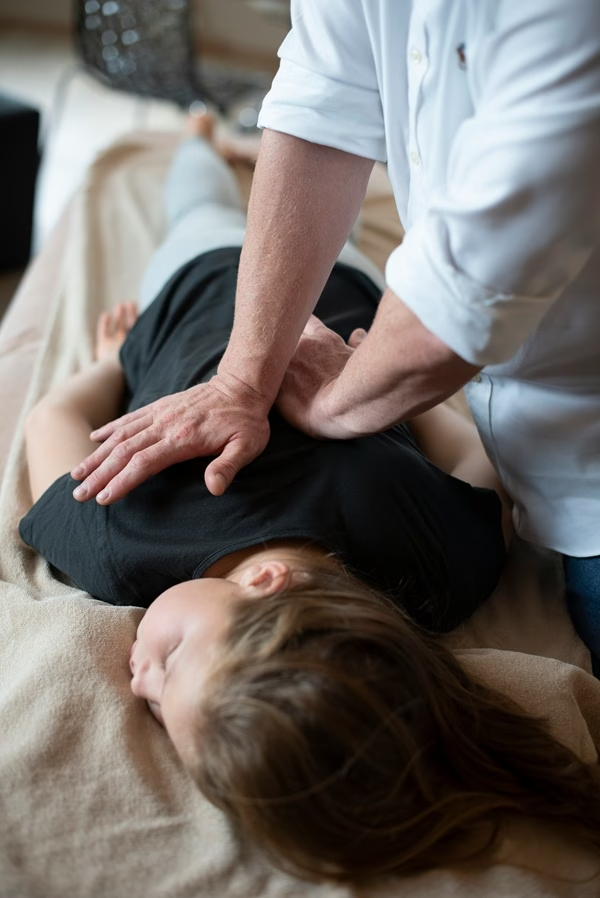Toronto resident stretching in bed to ease morning stiffness and back pain
You know the feeling…it’s morning stiffness. You wake up, stretch, and instead of feeling refreshed, you feel like the Tin Man before his oil can. Your back feels stiff, your neck doesn’t want to turn easily, and sometimes your body just doesn’t cooperate until you’ve had a hot shower or a walk around the block.
If this sounds familiar, you’re not alone. Many people in Toronto (and all over the world) wake up with some level of morning back pain. While it’s common, it’s not something you need to accept as “just getting older.” Understanding why morning stiffness happens is the first step to reducing it—and maybe even waking up pain-free.
In this article, we’ll explore why morning stiffness happens, what it means for your neck and back, and 5 simple ways to improve your mornings. If you need professional help, a Chiropractor Toronto can guide proper care.
Why Does Morning Stiffness Happen?
Morning stiffness in your neck and back is more than just a random annoyance. It’s your body’s way of saying, “something isn’t moving or recovering quite the way it should.”
Here are the most common reasons:
Lack of Movement Overnight
When you’re asleep, your muscles, joints, and ligaments aren’t moving as they do during the day. This lack of motion means fluids that normally keep your joints lubricated don’t circulate as much, leading to stiffness when you wake up.
Sleeping Position
Certain sleeping positions, like lying on your stomach with your head turned, can strain your neck. Side sleeping without proper pillow support can stress your shoulders and lower back, affecting spinal alignment.
 Mattress and Pillow Issues
Mattress and Pillow Issues
A too-soft or too-hard mattress, or an old pillow that doesn’t support your neck, can create pressure points and worsen neck and back stiffness.
Muscle Tightness from Daily Habits
Long hours sitting at a desk in Toronto’s office towers, scrolling on your phone during your TTC commute, or standing all day at work can lead to muscle tightness and contribute to desk job back pain by the time you wake up.
Underlying Conditions
Sometimes stiffness is linked to conditions like arthritis, disc problems, or past injuries. If stiffness is persistent or worsening, it’s a good idea to get checked by a professional.
5 Ways to Reduce Morning Stiffness
The good news? You can often make mornings easier with a few simple strategies.
- Improve Your Sleep Setup
- Choose a mattress that keeps your spine neutral (not sagging or arched). Medium-firm works for most people.
- Use a supportive pillow—your head should align with your spine, not tilt upward or downward.
- If you sleep on your side, place a pillow between your knees. If you sleep on your back, place one under your knees.
- Do a Gentle Morning Mobility Routine

Gentle morning mobility exercise like cat-cow or knee-to-chest stretch.
Instead of jumping straight into your day, give your body 5–10 minutes to loosen up. Try:
- Cat-cow stretches for your spine
- Gentle neck rotations
- Bringing knees to chest (while lying on your back)
- Shoulder rolls and arm circles
This encourages blood flow and joint lubrication before you head out the door.
- Stay Active During the Day
Movement is medicine for your spine. Toronto life often involves long commutes and desk jobs, so be intentional about moving more:
- Take the stairs at Union Station.
- Walk part of your commute if possible.
- Use reminders to stand up and stretch every 30–45 minutes.

Toronto city hall ice skating
- Manage Stress
Stress makes your muscles tighten, which can worsen stiffness by morning. Simple practices like deep breathing, stretching before bed, or even a 10-minute walk along the waterfront can help your body relax before sleep.
- Address Problems Early
If stiffness keeps happening, don’t ignore it. It could be your body’s way of hinting at an underlying issue with your spine or joints. Early attention often means faster results and less chance of chronic pain.
When Should You Be Concerned?
Morning stiffness that eases after 10–20 minutes of moving around is usually not serious. But if you notice any of the following, it’s time to seek help:
- Stiffness that lasts more than an hour every morning
- Stiffness with pain, tingling, or numbness in arms or legs
- Trouble moving your head, shoulders, or back normally
- Stiffness that’s getting worse instead of better
Life in Toronto and Morning Stiffness

Busy Toronto commuter on TTC
Toronto’s fast-paced lifestyle doesn’t make it easy on your spine. Whether you’re a Bay Street professional sitting through long meetings, a student carrying heavy backpacks, or a weekend warrior playing soccer at Downsview Park, your daily activities can play a huge role in how your neck and back feel each morning.
Even little things—like slouching during your TTC ride or spending hours scrolling TikTok in bed—can show up as stiffness the next day. The good news? Making small changes now can add up to big improvements in how you feel each morning.
Final Thoughts
Morning stiffness may be common, but it doesn’t have to be your “new normal.” By improving your sleep setup, adding a short morning mobility routine, staying active during the day, managing stress, and addressing problems early, you can give yourself a better chance of waking up refreshed instead of stiff.
If you’re finding that stiffness is becoming a daily frustration, or if it’s paired with ongoing neck pain or back pain, it may be time to get checked by a professional. At our Toronto clinic, we help people every day who thought stiffness was “just part of life” until they realized they could feel much better with the right care.
📍 If you’re looking for a “chiropractor near me” in Toronto, we’d love to help you find relief and get back to waking up ready for your day.
FAQS
Q1: Why do I experience morning stiffness in my neck and back?
A1: Morning stiffness in Toronto often occurs due to muscle inactivity overnight, poor sleep positions, and pressure on spinal joints, causing neck and back stiffness.
Q2: Can my mattress or pillow cause morning back pain?
A2: Yes. A mattress that is too soft or too hard, or a pillow that doesn’t support your spine, can lead to morning back pain and affect Spine Health Toronto.
Q3: How can I reduce morning stiffness naturally?
A3: Gentle morning mobility routines, stretches like cat-cow and neck rotations, staying active during the day, and proper sleep setups can help reduce Morning Stiffness Toronto.
Q4: When should I see a chiropractor for morning stiffness?
A4: If stiffness lasts more than an hour, is accompanied by pain, tingling, or numbness, or interferes with daily life, a Toronto chiropractor can assess and treat the issue.
Q5: How does chiropractic care help with neck and back stiffness?
A5: Chiropractic care restores motion to stiff spinal joints, reduces muscle tension, improves posture, and helps prevent chronic neck and back stiffness in Toronto residents.





